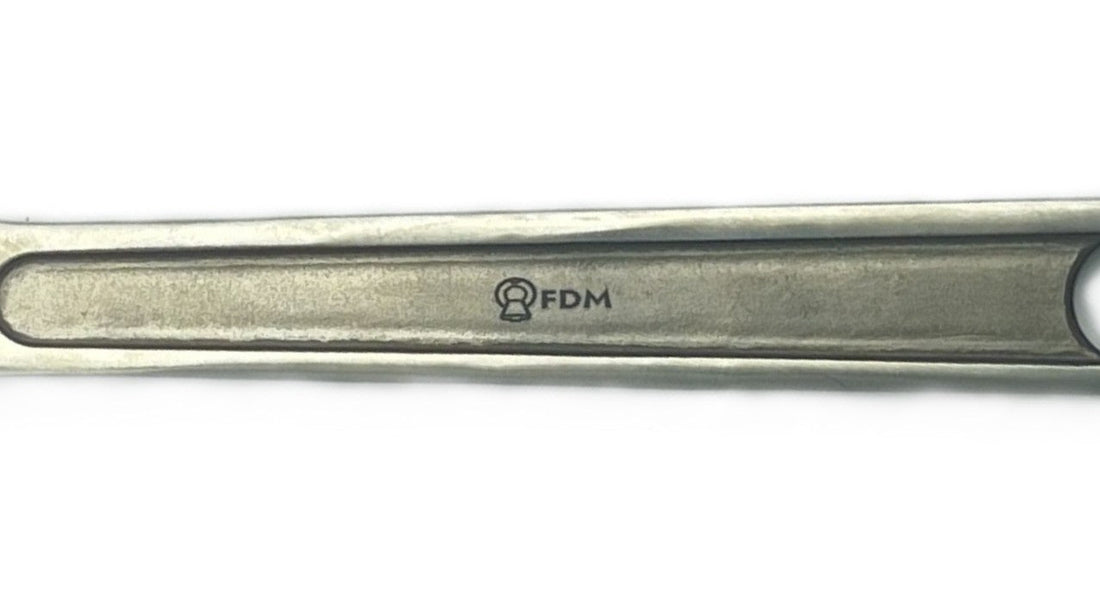
Why Titanium Tools Are the Best Choice for MRI Repair: A Guide for MRI Engineers
Share
As an MRI engineer, you know that repairing and maintaining MRI machines is a delicate task. The powerful magnetic fields in an MRI room don’t just demand precision—they require tools that won’t interfere with the machine’s operation or put safety at risk. A single misstep with the wrong tool can lead to damaged equipment, compromised imaging, or even injury. That’s why the material your tools are made from matters so much.At FDM Enterprises Tools, we craft titanium tools specifically designed for MRI repair. In this post, I’ll walk you through the standout benefits of titanium tools, compare them to the other options you might consider, and explain why titanium is hands-down the best choice for your work. Let’s dive in.The Critical Role of Non-Magnetic Tools in MRI RepairPicture this: you’re working inside the bore of an MRI machine, surrounded by a magnetic field strong enough to pull metal objects across the room. The last thing you want is a tool that gets yanked toward the magnet, damaging the machine or forcing you to stop what you’re doing. MRI systems rely on these intense fields to function, and any magnetic material nearby can distort images, throw off calibration, or become a safety hazard.That’s why non-magnetic tools are non-negotiable for MRI repair. But it’s not just about avoiding magnetism—your tools need to be tough, light, and reliable enough to handle the job. Titanium checks all those boxes and more. Let’s break down why.Why Titanium Tools Are Perfect for MRI RepairTitanium isn’t just another metal—it’s a game-changer for MRI repair tools. Here’s what makes it stand out:1. Non-Magnetic NatureTitanium’s magnetic susceptibility is practically zero, meaning it doesn’t interact with the MRI’s magnetic field. You can work right next to the magnet without worrying about interference, image distortion, or tools sticking to the machine. That’s peace of mind you can’t get with magnetic materials.2. Lightweight with Serious StrengthWeighing about 60% less than steel, titanium makes tools that are easy to handle—crucial when you’re maneuvering in the tight, awkward spaces inside an MRI. But don’t let the light weight fool you. Titanium’s strength-to-weight ratio is exceptional, rivaling many heavier metals. You get robust, reliable tools without the bulk, reducing fatigue on those long repair shifts.3. Corrosion ResistanceIn a medical setting, your tools might face cleaning agents, moisture, or other substances. Titanium’s natural oxide layer shrugs off corrosion, keeping your tools in top shape even after repeated exposure. No rust, no degradation—just consistent performance.4. Built to LastTitanium tools are tough. They resist wear, bending, and breaking, even with heavy, repeated use. That durability means fewer replacements and less downtime, which is a win for both your workflow and your budget.How Titanium Stacks Up Against Other OptionsYou’ve got options when it comes to tools, but not all materials are created equal for MRI repair. Let’s compare titanium to the alternatives and see why they don’t measure up:Stainless Steel ToolsStainless steel is everywhere—durable and familiar—but it’s a problem in MRI rooms. Most grades contain iron, making them magnetic. Even a little magnetism can mess with imaging or pull tools toward the magnet. I’ve heard of cases where forgotten stainless steel tools got sucked into an MRI, damaging the system and racking up repair bills. Titanium sidesteps this risk completely.Aluminum ToolsAluminum’s light, sure, but it’s not perfect. Depending on the alloy, it can still have magnetic properties—not ideal near an MRI. Worse, it’s weaker than titanium. Under the stress of tightening bolts or prying components, aluminum tools can bend or snap. You need something that can keep up with the job, and aluminum falls short.Plastic or Composite ToolsPlastic tools are non-magnetic, which sounds promising. But they’re a liability in practice. They lack the strength and rigidity for serious repair work—think snapped handles or stripped heads when you’re dealing with stubborn fasteners. A broken tool mid-repair could nick a sensitive component, and that’s a headache you don’t need. Plastic’s just not cut out for the demands of your work.Other Non-Magnetic Metals (e.g., Brass)What about brass or other non-magnetic alloys? They’re free of magnetism, but that’s where the advantages stop. Brass is heavier and softer than titanium, wearing down faster and feeling clunkier in your hand. It also doesn’t resist corrosion as well, which matters in a medical environment. Compared to titanium, these options are a compromise at best.Why Titanium Wins Every TimeWhen you line up the options, titanium pulls ahead. It’s not just non-magnetic—it’s lightweight, strong, corrosion-resistant, and durable. No other material combines all these traits so effectively. That means you can trust your tools to perform without fail, keeping you safe and efficient.Think about it: lighter tools mean less strain during those marathon repair sessions. Stronger tools mean confidence tackling tough tasks. And durability means you’re not constantly replacing gear. At FDM Enterprises, we’ve tailored our titanium tools to meet the exact challenges you face as an MRI engineer—precision engineering for precision work.
Real Talk from the Field: “Since switching to FDM Enterprises titanium tools, I’ve noticed a huge difference. They’re light, easy to handle, and I don’t stress about magnetic interference. My repairs are faster and safer now.” – A. Smith, Senior MRI Engineer
Wrap-Up: Elevate Your MRI Repair GameYour tools are an extension of your expertise, and in MRI repair, there’s no room for second-best. Titanium tools from FDM Enterprises deliver the perfect mix of non-magnetic reliability, strength, and longevity that other materials can’t touch. They’re designed with you in mind—built to make your job easier, safer, and more effective.Don’t settle for less. Check out our range of titanium tools at the FDM Enterprises website, crafted specifically for MRI repair. Invest in the best and take your repair work to the next level. You’ll feel the difference from the first turn of the wrench.
